-
WHATEVER HAPPENED TO MY REVOLUTION/TOUT CE QU'IL ME RESTE DE LA RÉVOLUTION (Davis)
JUDITH DAVIS: WHATEVER HAPPENED TO MY REVOLUTION/TOUT CE QU'IL ME RESTE DE LA RÉVOLUTION

JUDITH DAVIS IN WHATEVER HAPPENED TO MY REVOLUTION
Old radicalism meets new, with an improvisatory fieel
Judith Davis sent an iPhone film to the Rendez-Vous with French Cinema. She meant to attend but her purse was stolen, in it her passport, the day before departure, so she could not go. This somehow fits the improvisational and sudden feel of her energetic film about revolutionary and socialist impulses then and now, Sixties radicals grown old and their obstreperous offspring. Davis spoke in her video of working with her own little collective, whose performances reflect group decisions.
In the film, the protagonist, Angèle (Davis) is an idealistic urban planner confused about where her once radical parents, long separated, now stand, since they have made compromises to maintain a comfortable lifestyle. Not only that, but today's Paris is a world where the spirit of 1968 seems long forgotten.
The movie is a blend, pretty successful because of the fresh energy of the action, between the story of Angèle's reunion with her long estranged mother Diane Sorel (Mireille Perrier, J’entends plus la guitare) and a love-and-like story of relations with an oddball group of kindred spirits and a new potential boyfriend, Saïd (Malik Zidi).
This involves the work of the collective group of improvisational actors of which Davis is a proud member, so there are, shall we say, "actorly" moments throughout, but this contributes to the lively energy of what is a film on the cusp of a certain French bourgeois experience: old radicalism meets new.
The turn comes when Angele suddenly learns from her father that her mother didn't ever mean to be as estranged as she has been but really had wanted the children to come and live in the country with her, years ago. The reunion strengthens Angèle's convictions, but also her family ties. Meanwhile, out in the country a wild performance by a commercial-aligned individual that feels like an extreme episode of Donald Trump's "The Apprentice" leads to a sudden burnout and a new member of Angèle's troup of people gathered to find themselves.
If we realize that these are all performances, and the result a kind of Brechtian Alienation Effect, we can enjoy a very lively film that, despite its eccentricity and political high seriousness, is also at heart, as the happy ending shows, a love story.
Whatever Happened to My Revolution/Ce qu'il me reste de ma révolution, 88 mins., debuted in five French festivals starting with d'Angoulême 22 Aug. 2018. French theatrical release 3 Feb. 2019, with good reviews (AlloCiné press 3.6); Ouest France called it "Drôle et juste." Screened for this review as part of the UniFrance-Film Society of Lincoln Center Rendez-Vous with French Cinema, Mar. 2019.
Saturday, March 2, 3:30pm (Q&A with Judith Davis)
Monday, March 4, 1:30pm
Last edited by Chris Knipp; 03-05-2019 at 11:17 AM.
-
ART OF SEDUCTION, THE MADEMOISELLE DE JONCQUIÈRES (Emmanuel Mouret 2018)
EMMANUEL MOURET: THE ART OF SEDUCTION/MADEMOISELLE DE JONCQUIÈRES (2018)

EDOUARD BAER AND CECILLE DE FRANCE IN MADEMOISELLE DE JONCQUIERES
An elegant 18th-century moralistic tale whose motivations remain a bit vague
Emmanuel Mouret's Mademoiselle de Joncquières is a decided contrast to the director's delicate and playful Shall We Kiss? which I reviewed eleven years ago. It's like a pared-down version of Les Liaisons Dangereuses (but based on in a story in Denis Diderot's Jacques the Fatalist instead of Choderlos de Laclos renowned and complex epistolary novel) and stars Édouard Baer and Cécile de France as an 18th-century rake and the sophisticate, burned when he drops her, who takes revenge by bating him with a beautiful virgin who really isn't. It's a beautiful film with some good lines but I feel the casting is off. De France is trying hard to be beautiful but not hard enough to be mean. Baer is an appealing actor but that's the problem, not enough edge. Forget this and watch either Vadim's 1959 Dangerous Liaisons or Frears' 1988 English-language one, one of my favorite films of the Eighties. Watched at UGC Danton 24 October 2018. AlloCiné press rating 3.9, showing that the French critics were generally quite favorable.
Rewatched as part of the Rendez-Vous with French Cinema at Lincoln Center 2019. The audience was large and the reaction positive. The film is pleasing - and efficient: Mouret wastes no time in delivering the succession of scenes and dialogue. However the impression remains strong that the main characters are too pleasing and bland, the action too predictable. It's hard to see complexity or meanness in either of them. And hence the motivations feel more theoretical than visceral. it is all a - very beautiful and graceful - going through the motions. But the film is finely made, the mise-en-scène handsome from first to last. And the mimicry of elaborately polite 18th-century French conversation is patient and consistent, both in the writing and in the actors' attempted delivery. And yet, the appreciation of all these elements cannot lessen, but only increase, one's sense that something essential is missing that would give this real logic and bite appropriate to the period so attractively recreated in the settings and costumes.
The Art of Seduction/Mademoiselle de Joncquières, 110 mins., debuted at Toronto, then Busan and Gothenberg, last fall and early 2019. Initially watched in Paris Oct. 2018. Screened for this review as part of the UniFrance-Film Society of Lincoln Center Rendez-Vous with French Cinema, Mar. 2019.
Rendez-Vous Showtimes:
Friday, March 1, 9:00pm (Q&A with Emmanuel Mouret and Edouard Baer)
Monday, March 4, 4:00pm
Last edited by Chris Knipp; 03-09-2019 at 01:14 PM.
-
IN SAFE HANDS/PUPILLE (Jeanne Henry 2018)
JEANNE HENRY: IN SAFE HANDS/PUPILLE (2018)
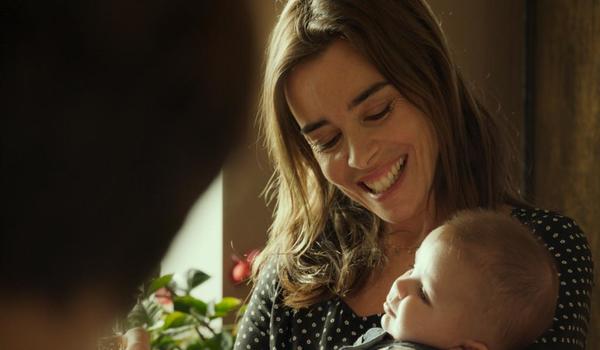
ÉLODIE BOUCHEZ AND "THÉO" IN IN SAFE HANDS
France's anonymous adoption system for newborns dramatized
Jeanne Herry's second feature In Safe Hands/Pupille, about France's anonymous adoption system for newborns, is one of several offerings in the 2019 New York Rendez-Vous with French Cinema series that relate to what can broadly be considered state social issues, along with Thomas Lilti's The Freshman/première année critiquing the state's ruthless system filtering out entrants into medical school and Invisibles, about a daytime shelter for homeless women. The French take their social services seriously and are particularly proud of their anonymous adoption system (called "l'accouchement sous X"). In Safe Hands is well researched, warmly acted, and intricately edited to interweave many strands, including mother, baby, nurses, doctors, social worker, foster parent, adoptive parents, and so on.
The caring comes through in the warmth of the performances, which most notably include the popular and often funny Sandrine Kiberlain as one of the caseworkers, GilleS Lellouche as the chosen foster parent for the three months awaiting adoption, and Élodie Bouchez, with that big smile of hers, as the now single adopting parent who has steadfastly waited out a nine year process.
It's hard to praise the construction of this movie too much. It tells its basic story well, and it provides backstories, or at least little details of the lives of each of its main characters. Jordan Mintzer isn't wrong in his Hollywood Reporter review, though, that the "thing" of Kiberlain's and Lellouche's characters is overdone, that there are a number of saccharine moments, and that the frequent closeups of the baby could fill a number of Huggies commercials. The dp Sofian El Fani did well nonetheless to show us people's emotions and give us closeups of the baby's changing emotional states, which are remarkable. (Who is this baby, one would like to know?) But the dp needn't have provided quite so many in-our-faces shaky-cam closeups of other objects.
First impression is the birth, then the careful social worker who explains things and takes note of the mother's wishes. She is a 21-year-old university student who became aware she was pregnant too late to do anything about it. But later, when "Théo" gives evidence to the temporary foster parent, Jean (Gilles Lellouche) that he may be shut down or limp, that there could be some problem, the receiving social worker is reluctant at fist to break the secrecy of her relation with the mother by revealing further information hat might be of urgent use.
Through several steps back in time the film shows us how Alice survived a long period of waiting, and then a postponement when she broke up with her partner and was automatically made to wait further to settle into single status (though the state had just okayed single-parent adoptions, allowing Alice a second chance eventually).
Key also are some bureaucratic sessions when various parties heatedly debate which adoption candidates or candidate will get to be the adoptive parent of Théo. Fur flies and foul words are used. But the sense is that there is passionate caring here, and that the system is working.
Much of this film could just be a TV special, except it's not, because the French are clearly willing to lavish some of their best talent on such material, and did so here. Pupille got seven César awards. Incidentally, the César Best Film winner was another picture about a social issue, an agonizing critique of a lax aspect of the French court "Juge d'Instruction" system in divorce custody situations seen in the RendezVous with French Cinema of 2018, Xavier Legrand's Custody.
In Safe Hands/Pupille, 109 mins., debuted at Angoulême, showing in six Francophone fests in late 2018. It opened in French, Swiss, and Belgian theaters 5 Dec. 2018 and got high marks from French Critics: AlloCine press rating 4.3. Screened for this review as part of the UniFrance-Film Society of Lincoln Center Rendez-Vous with French Cinema, Mar. 2019.
Monday, March 4, 6:15pm (Q&A with Élodie Bouchez)
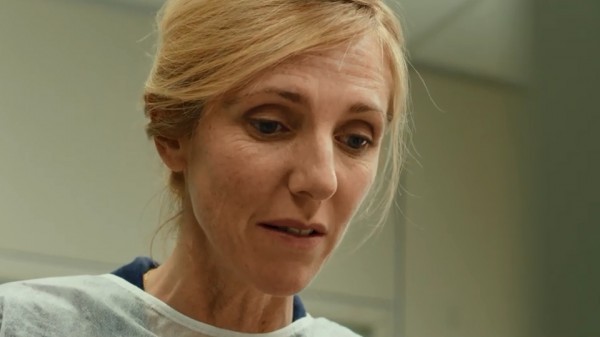
SANDRINE KIBERLAIN IN IN SAFE HANDS/PUPILLE
Last edited by Chris Knipp; 03-05-2019 at 08:16 PM.
-
THE SUMMER HOUSE/LES ESTIVANTS (Valeria Bruni Tedeschi 2018)
VALERIA BRUNI TEDESCHI: THE SUMMER HOUSE/LES ESTIVANTS (2018)
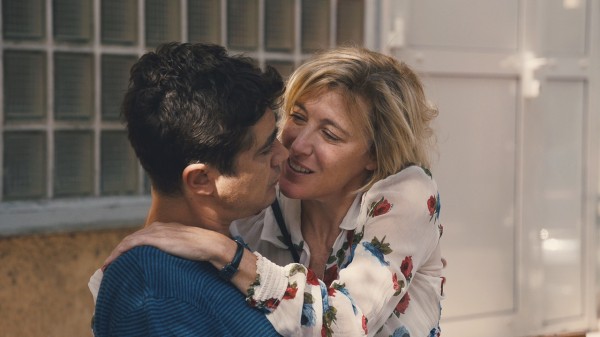
RICARDO SCAMARCIO, VALERIA BRUNI TEDESCHI IN THE SUMMER HOUSE
A Valeria Bruni Tedeschi family drama à la Chekhov, by Fellini
The Summer House/Les Estivants, the prolific actress Valeria Bruni Tedeschi's fourth feature, is perhaps her most complex and one of her best. And though she is constantly seen on stage and screen in French and Italian, in which she is equally fluent, and has 90 screen acting credits, she obviously cares very much about her relatively small number of directorial efforts, because they are so autobiographical, speaking much about her complicated Franco-Italian industrial family and usually incorporating family members into the cast.
Note that Bruni Tedeschi recently directed for television a version of Chekhov's Three Sisters (R-V 2016). The Summer House, an elaborate, full-dress, impressively cast and acted family gathering at the family summer place of a wealthy industrialist, with a sister Elena (Valeria Golino), mother Louisa (Marisa Borini), and adopted daughter on hand, has all the trappings of Chekhov and then some. These notably include Elena's older husband, the wealthy industrialist and lord of the manner who has fired thousands of employees (Pierre Arditi) This is like Chekhov by Bruni Tedeschi with staging by Fellini. And this is also self-reflective, because Anna, Bruni Tedeschi's character, is here working on a film - though in a comical preliminary scene including Frederick Wiseman as a board member it doesn't seem to have gotten the funding it sought - with her cowriter Nathalie (B.T.'s actual cosripter Noémie Lvovsky).
All members of Anna's complicated family seem to be on hand, including the director's own mother as her character's mother again, two actors competing apparently to play Anna's brother who died of AIDS (as did B.T.'s actual brother Virginio), and her brother's ghost (Stefano Cassetti) haunting the grounds. The film juggles a lot of subplots, including intense ones "downstairs," among the estate's household of staff, which include Yolande Moreau and François Négret. Also on hand is B.T.'s adopted African daughter Oumy Bruni Garrel, two members of the Comédie Française, Laurent Stocker and Bruno Raffaelli, and Italian heartthrob Riccardo Scamarcio as Luca, Anna's love, who is drifting away from her, standing in for her ex-husband Louis Garrel.
Late in the game there comes some nice diegetic music as a large older gentleman called Bruno (Bruno Raffaelli) sings German opera and lieder, with Louisa accompanying him on the piano.
The only taint on this enjoyable romp is how old-fashioned and derivative it is - in many respects. Bruni Tedeschi's own creation of Anna, a creative madwoman, driven crazy by by Luca's abandonment, is original with her. And as Luca, Scamarcio is both very physical and real, fleshy, dark and handsome with his flashing pale blue eyes, kissing her, smoking, and yet perhaps also imaginary some, or even all, of the time. All this is certainly sui generis. It's just the whole idea of the wealthy family summerhouse gathering of moody isolated planets that comes from the Russians, and the whole social setting of inherited wealth, with servants, an old house, is very vieux jeu - not to mention the fact that Burni Tedeschi has done this kind of thing herself, speaking about her own and her family's life, before.
But this familiarity does not keep The Summer House from entertaining, if you sit back and ride with the full extent of its meandering, anecdotal unfolding - though Jessica Kiang clearly did not, since in her Variety review she called this film "aggravatingly insular." (See however Boyd van Hoeij's more appreciative and more detailed review for Hollywood Reporter.)
The Summer House/Les Estivants, 122 mins., debuted at Venice (Out of Competition) Sept. 2018 and was shown in at least five other festivals, including Mumbai. French theatrical release began 30 Jan. 2019 (AlloCiné press rating 3.1). Screened for this review as part of the UniFrance-FSLC Rendez-Vous with French Cinema at Lincoln Center, Mar. 2019. U.S. Premiere.
Rendez-Vous showtimes:
Tuesday, March 5, 1:30pm
Friday, March 8, 6:00pm
Last edited by Chris Knipp; 03-06-2019 at 05:12 AM.
-
SOPHIA ANTIPOLIS (Vergill Vernier 2018)
VERGIL VERNIER: SOPHIA ANTIPOLIS (2018)
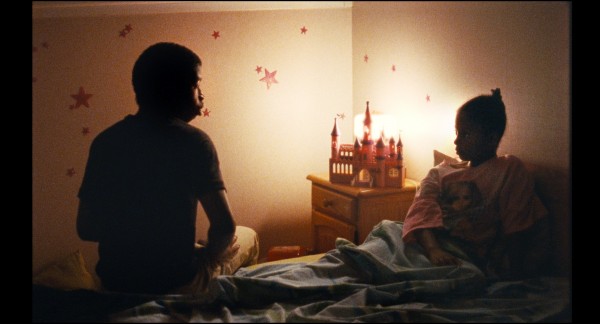
Improvisational anomie
About Vergil Vernier's debut featureMercuriales I was harsh: "Virgil Vernier works with interesting documentary elements and exceptional access to intimate situations to put together a sketchy fiction that ultimately does not cohere," I wrote in my 2015 New Directors/New Films series review. Vernier's sophomore film, Sophia Antipolis, presented within the March 2019 Rendez-Vous with French Cinema schedule and introduced as a Film Comment selects film by that FSLC publication's editor, is a chance for a reassessment. And it shows Vernier still intent in his use of non actors and evocation of urban anomie. He still deserves to be considered promising. Vernier has widened his scope and strengthened his thrust, which is to use his vignettes collectively to scare us, suggesting a world with hints of the occult and the apocalyptic around its edges.
But from the first Vernier is up to his previously demonstrated fascination with young women. Of Mercuriales I wrote, " Vernier's male fascination with nubile female bodies, even a young girl's, verges on the voyeuristic and exploitative." Sophia Antipolis starts right off with young women stripping to show their breasts, pleading with an unseen cosmetic surgeon to operate quickly enlarge their already perfectly nice looking poitrines. One of these girls, named Sophia after the town, is only sixteen, and has faked her ID to appear eighteen and therefore have the right to decide on such surgery without parental consent. This is putatively the girl who will stop turning up for her best girlfriend at school and start hanging out with rough crowd, then become a little too wild even for them, then turn up as a charred body.
This time Vernier's film is dominated by the haunting mystery of a girl's charred body found in a building in the eponymous Sophia Antipolis, a garish, giant urban mall that's become a kind of Silicon Valley outpost in the middle of the French Riviera. Such a setting, familiar to the filmmaker from an early age and meant by him to represent a place more ideal or nightmarish than real, well suits his taste for alienation.
Around the image of the charred body other vignettes hover with an uneasy blandness. There is a Vietnamese woman whose older French husband has died, and who's tempted at her door, Seventh Day Adventist-style, into attending the meeting of a "spiritual" group. Vernier likes to use real-life stuff: here, the group leader - its members insist it's not a cult - demonstrates the existence in the world of inexplicable mysteries by transforming a hypnotized man's body into a rigid board you can sit on, stretched between two chairs.
Things relax temporarily as two of the women at the meeting have a nice day together, going on a walk, having ice cream, and admiring the sea. Then we join two black men with Arabic names. One is a newcomer in the area, who served four years as a sailor. He now follows around the other, a tall, goateed devotee of Spirulina, and is apparently induced by him to join a vigilante group and attend a training session in Israeli Krav Maga fighting methods that look pretty violent. This group brings to mind the right wing militants the smartest student secretly trains with in Laurent Cantet's The Workshop (Rendez-Vous 2018), which, however, seemed more fully realized. (A Film Comment article refers to the vigilantes as "a right-wing paramilitary outfit.") Whatever they are, when they kidnap a man they suspect of pedophilia, the newcomer has second thoughts and flees on foot from the scene. Maybe this all coheres better this time, and the Super16 cinematography remains to intensify the bright colors in the Riviera sunlight. But for me, it still didn't quite add up.
Sophia Antipolis, 98 mins., debuted at Locarno, where it was nominated for a Golden Leopard; presented also in three other festivals, including Rotterdam. French theatrical release 31 Oct. 2018. Only 13 reviews listed on AlloCiné but favorable, with 3.7 press rating. Screened for this review as part of the UniFrance-Film Society of Lincoln Center Rendez-Vous with French Cinema, Mar. 2019.
Rendez-Vous sowtimes
Tuesday, March 5, 4:00pm
Sunday, March 10, 5:30pm
Last edited by Chris Knipp; 03-06-2019 at 04:13 AM.
-
TIME OF THE PIRATES, THE/SEULS LES PIRATES (Gaël Lepingle 2018)
GAËL LEPINGLE: THE TIME OF PIRATES/SEULS LES PIRATES (2018)
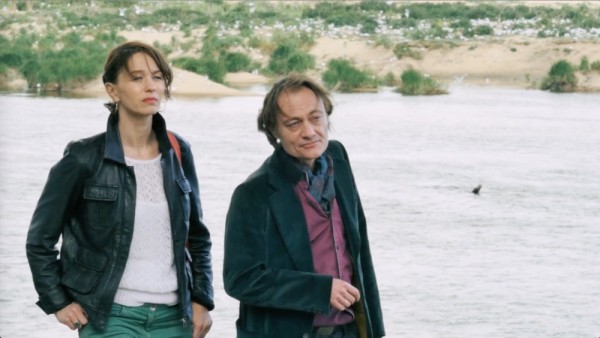
DELPHINE CHUILLOT AND LUDOVIC DOUARE IN THE TIME OF PIRATES
A fight against relocation
This little film, hovering on the brink between documentary and fiction, centers around a group of people who are getting evicted from their housing, particularly a theatrical man who (or so he says) has lost his voice due to cancer, and at first speaks only in whispers, Géro (Ludovic Douare). He takes in his girlish but confident 18-year-old nephew Léo (Renan Prévot) as a temporary all-round theatrical apprentice for the summer.
With Géro we enter a spunky marginal French world on the edge of social networks and urban planning in a suburban world of the Loire Valley. Géro is a stubborn, angry person, who was in a brutal reformatory kind of school when young, which may have marked him for life. Géro refuses to cooperate with relocation services and therefore risks winding up on the street. We never see Géro evicted; his long-gestating play eventually gets put on. The film is divided up into sections: 1. Les bonnes volontés (Good Wills), 2. Toute voiles dehors (Headsails and Courses), 3. Ne pas mourir (Not to die); what these mean is anybody's guess.
There are some men Léo meets at Géro's who're involved in a devious business, which may involve human trafficking. For some reason Léo winds up with one of these men in flight for several days. There are also women who work at an agency, one of whom leaves, and one of the women may be the former companion of Géro.
While the various segments of The Time of Pirates are momentarily interesting in themselves and characters are well realized, they never cohered, for me, into a story that makes emotional or artistic sense. The film seems as marginal as its subject matter. Compare the similarly marginal material of Pierre Schoeller's moving 2008 Versailles (R-V 2009), which worked because of a compelling storyline and remarkable performances by Guillaume Depardieu and a seven-year-old boy named Max Baissette de Malglaive.
A collection of clippings about the film helps explain what Seuls les pirates is seeking to do and its reception in France.
The Time of the Pirates/Seuls les pirates, 89 mins., debuted July 2018 at FID Marseille, where it won the Grand Prix, and showed in Nov. at Belfort Entrevues. Listed on IMDb but not on AlloCiné. Screened for this review as part of Rendez-Vous with French Cinema at Lincoln Center, Mar. 2019.
Rendez-Vous showtimes:
Tuesday, March 5, 6:15pm
Wednesday, March 6, 2:00pm
Last edited by Chris Knipp; 03-05-2019 at 05:58 AM.
-
KEEP AN EYE OUT!/AU POSTE! (Quentin Dupieux 2018)
QUENTIN DUPIEUX: KEEP AN EYE OUT!/AU POSTE! (2018)

GRÉGIRE LUDVIG, BENOÎT POELVOORDE IN AU POSTE!
Droll interrogation
A few years ago I reviewed Dupieux's film Reality, which featured a prolonged and frantic search for an Oscar-winning groan. (It was for a proposed horror film.) Au poste (the French title is more succinct, but the English one is a playful pun), so neatly constructed it runs only 73 minutes, is a standard Eighties-style police procedural focused on a relentless, drawn-out interrogation. Well, not really, but that's the format within which it ostensibly works. It's all in the whimsical drollery - with a touch of the macabre that's sometimes scholboyish. The concentrated focus on a shaggy whodunit makes this more uncomplicated enjoyment than the earlier film. And yet it is a self-reflective piece that has links with the French Nouveau Roman as well as with Claude Miller's 1981 Garde à vue (which featured Romy Schneider, Michel Serrault, Lino Ventura and Guy Marchand.) Dupieux makes do with lesser luminaries, but he is well served by the confident lead performance of Benoît Poelvoorde as the high ranking policeman in the room, Le commissaire Buron.
The man Buron is interrogating is called Fugain, Louis Fugain (Grégoire Ludvig). Fugain is the prime suspect in a murder case because he was found with the corpse of a man lying in a pool of blood. He insists he only found the man when returning to his apartment building late at night. Something untoward happens to an underling, Philippe (Marc Fraize) while the Commissaire is out of the room. Is Fugain perhaps accident-prone, or rather prone to induce accidents in others, like the creepy protagonist of Kiyoshi Kurosawa's Cure? Yet Fugain is a polite, well-spoken individual, the picture of seeming innocence.
What is it with that other Philippe's eye, or rather, the blur he has in the place of one of them? Oh, he's just always been line that, he says. It is that first detail that informs us this story not only plays with the interrogation theme, but has surreal, or bizarre elements, like, also, the way Buron's son casually recounts a suicide attempt while offering him a hot dog. Another odd, avantgardist aspect is the flashbacks in which a character meets up with someone in the present time. That could be thought-provoking in narrative terms, but merely odd elements are a guy smoking cigarettes with a hole in his chest, and one eating an entire oyster, with the shell, crunching down. Such self-indulgent whimsy is for pure fans of the absurd.
The commissioner's interrogation is "excruciating" only in the sense that he lets it drag on and on. He not only enjoys it for its own sake, but uses it as the opportunity to hold forth on little points about which he has very particular opinions. In this, Dupieux is celebrating and mocking the detective in films and stories who is obsessed with detail and pompous about his ideas, like Hercule Poirot. Unlike Inspector Antoine Gallien (Lino Ventura in Garde à vue), whose relentless interrogation is aimed at ferreting out the truth, Commissaire Buron simply enjoys the process, and his own whimsies. So we might say Commissaire Buron is a stand-in for the filmmaker, Quentin Dupieux. Like Dupieux, who operates on multiple levels, Buron gives the impression of being both benign and dangerous.
Fugain insists on his innocence, which he thinks so obvious he is in a hurry to be sent home. And, since it's only routine, he thinks, if there must be a delay for the Commissaire to do something else,why can't he go home and come back to finish it tomorrow? Oh, no, replies Buron, "This is not an interrogation à la carte."
Indeed not. And there is a different surprise awaiting us, and then Fugain, at the film's end.
TRAILER] (This movie can be watched online, Amazon or Vudu).
Keep an Eye Out!/Au poste!, 73 mins., debuted Sept. 2018 at Berlin Fantasy Filmfest; four other festivals are listed on Imdb. It released theatrically in France July 4, 2018, and got very good reviews (AlloCiné press rating 3.9, i.e., 78%). Screened for this review at the UniFrance-Film Society of Lincoln Center New York Rendez-Vous with French Cinema, Mar. 2019.
Rendez-Vous with French Cinema showtimes:
Tuesday, March 5, 8:15pm
Sunday, March 10, 7:45pm
New York Premiere
Last edited by Chris Knipp; 02-06-2020 at 08:25 AM.
 Posting Permissions
Posting Permissions
- You may not post new threads
- You may not post replies
- You may not post attachments
- You may not edit your posts
-
Forum Rules





 Reply With Quote
Reply With Quote







Bookmarks